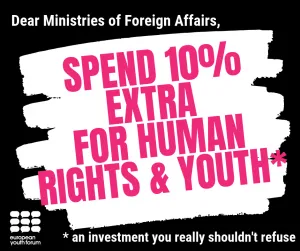
On Friday 3th of May 2019, and following several years of budget reduction within the Council of Europe, its Secretary General Mr. Thorbjørn Jagland proposed a contingency plan that would put an end to the financing of the Council of Europe’s Youth Sector from the Ordinary Budget of the organisation as of 1 January 2021. If the budgetary crisis of the CoE does not resolve and if this contingency plan is approved, it is expected that 2021 will see the end of a number of opportunities for youth, including:
- the European Youth Foundation grants, a significant source of funding for youth organisations which has allowed a number of NGOs, including EFIL and AFS, to offer more opportunities for young participants and volunteers;
- the Advisory Council on Youth of the CoE, which allows for co-management between youth and government representatives by rightfully giving young people the same decision-making power as governments in youth policy development;
- the European Youth Centers in Budapest and Strasbourg, in which multiple (training) events for youth are held each year;
- the creation of toolkits and other resources supporting democratic citizenship education, intercultural learning and human rights education;
- direct support measures for national youth policy development.
The European Federation for Intercultural Learning (EFIL) and national AFS organisations are deeply concerned about this proposal. The Council of Europe’s Youth Sector has been playing an essential role in enabling youth participation and youth work, in enhancing equal access to rights and in contributing to the creation of inclusive and peaceful societies, and its maintenance and continuity are crucial to youth in Europe and beyond. EFIL and AFS also express concerns about the alternative to move to a Partial Agreement, as it would be detrimental to the current co-management system and to the essential form of youth participation that is the Advisory Council on Youth.
In addition to the fact that the Russian Federation hasn’t been paying its membership fee to the CoE since 2017 and that Turkey decided to return to its original status as an ordinary contributor, the situation is that the Committee of Ministries of the Council of Europe has applied a zero nominal growth policy to the budget of the organisation for the past 10 years, contributing to the overall CoE budget reduction.
Considering the essential role of the Youth Sector and the financial situation of the CoE, EFIL and AFS organisations call for Member States to consider and agree on increasing their financial contribution to the Council of Europe by 10% in order to allow for the maintenance of the Youth Sector in the ordinary budget of the organisation.

